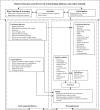Determinants of dietary behaviour in wheelchair users with spinal cord injury or lower limb amputation: Perspectives of rehabilitation professionals and wheelchair users
- PMID: 32004359
- PMCID: PMC6993975
- DOI: 10.1371/journal.pone.0228465
Determinants of dietary behaviour in wheelchair users with spinal cord injury or lower limb amputation: Perspectives of rehabilitation professionals and wheelchair users
Abstract
Objective: This study aims to identify determinants of dietary behaviour in wheelchair users with spinal cord injury or lower limb amputation, from the perspectives of both wheelchair users and rehabilitation professionals. The findings should contribute to the field of health promotion programs for wheelchair users.
Methods: Five focus groups were held with wheelchair users (n = 25), and two with rehabilitation professionals (n = 11). A thematic approach was used for data analysis in which the determinants were categorized using an integrated International Classification of Functioning, Disability and Health and Attitude, Social influence and self-Efficacy model.
Results: Reported personal factors influencing dietary behaviour in wheelchair users were knowledge, boredom, fatigue, stage of life, habits, appetite, self-control, multiple lifestyle problems, intrinsic motivation, goal setting, monitoring, risk perception, positive experiences, suffering, action planning, health condition, function impairments, attitude and self-efficacy. Reported environmental factors influencing dietary behaviour in wheelchair users were unadjusted kitchens, monitoring difficulties, eating out, costs, unfavourable food supply, nutrition education/counselling, access to simple healthy recipes, eating together, cooking for others, and awareness and support of family and friends.
Conclusions: Important modifiable determinants of dietary behaviour in wheelchair users that might be influenced in lifestyle interventions are knowledge, fatigue, habits, self-control, intrinsic motivation, risk perception, attitude and self-efficacy. It is recommended to involve relatives, since they appear to significantly influence dietary behaviour.
Conflict of interest statement
The authors have declared that no competing interests exist.
Figures

References
-
- Ng M, Fleming T, Robinson M, Thomson B, Graetz N, Margono C, et al. Global, regional and national prevalence of overweight and obesity in children and adults 1980–2013: A systematic analysis for the Global Burden of Disease Study 2013. Lancet. 2014;384(9945): 766–781. 10.1016/S0140-6736(14)60460-8 - DOI - PMC - PubMed
-
- Wadey R, Day M. A longitudinal examination of leisure time physical activity following amputation in England. Psychol Sport and Exerc. 2018;37: 251–261.
Publication types
MeSH terms
LinkOut - more resources
Full Text Sources
Medical

